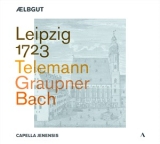Von der Suche nach dem Leipziger Super-Kantor schreibt Michael Maul in seinem unterhaltsamen und lehrreichen Beitrag im Booklet. Uns selbst kommen Leipzig und seine Kantorenstelle einmal mehr als eine musikalische Wundertüte vor. Allein die Werke, die 1723 als Bewerbung für die Nachfolge des verstorbenen Kantors Johann Kuhnau eingereicht und aufgeführt wurden, sind kaum zu überbieten. Jeder Personalchef würde heute Kandidaten mit solchen Referenzen mit Kusshand einstellen.
Kaum zu überbieten sind auch die Interpretationen der musikalisch doch sehr unterschiedlichen fünf Kantaten. Eines eint sie am Ende dennoch – und das ist auch das herrausragende Merkmal dieser Produktion: Die Interpreten singen keinen Text, sie gestalten Worte, Geschichten – sie lassen uns am Geschehen hautnah teilnehmen. Sie machen das jedoch nicht mit dem didaktischen Zeigefinger sondern als Diener des Textes und der Musik. So bleibt trotzt mancher dramatischer Augenblicke stets die Intimität und damit auch die spirituelle Strahlkraft des jeweiligen Werkes erhalten.
Natürlich ist es schön, etwa Bach-Choräle in angebrachter Chorstärke zu hören, aber auch die quasi solistische Entschlüsselung von Chorpassagen durch das Vokalquartett Aelbgut – Isabel Schicketanz (Sopran), Stefan Kunath (Alt), Florian Sievers (Tenor), Martin Schicketanz (Bass) – berührt durch den sehr persönlichen Klang.
Michael Maul writes about the search for the Leipzig super-cantor in his entertaining and instructive contribution in the booklet. To ourselves, Leipzig and its cantor position once again seem like a musical grab bag. The works alone, which were submitted and performed in 1723 as an application to succeed the late cantor Johann Kuhnau, are hard to beat. Any personnel manager today would immediately hire candidates with such credentials.
The interpretations of the musically very different five cantatas are also hard to beat. One thing unites them at the end – and that is also the outstanding feature of this production: The interpreters do not sing a text, they create words, stories – they let us participate in the events very closely. However, they do not do this with a didactic forefinger but as servants of the text and the music. In this way, despite some dramatic moments, the intimacy and thus also the spiritual radiance of the respective work is always preserved.
Of course it is nice to hear, for example, Bach chorales in appropriate choral strength, but also the quasi-soloistic decoding of choral passages by the vocal quartet Aelbgut – Isabel Schicketanz (soprano), Stefan Kunath (alto), Florian Sievers (tenor), Martin Schicketanz (bass) – touches with its very personal sound.






















